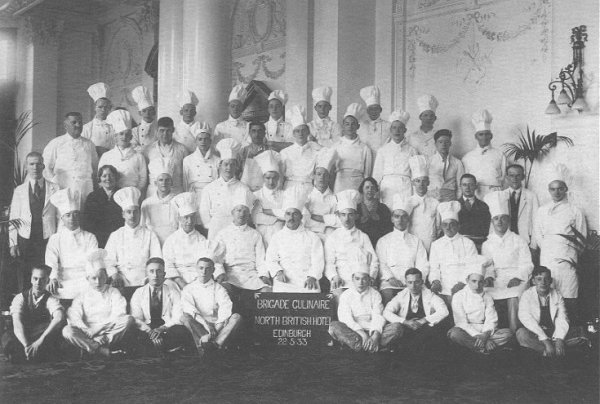Larger than Life
A five star hotel is both a fantasy and a
factory. The fantasy is the world the guests enter when they step over the front door. In
such a world champagne flows and the patisserie chef can spin spring flowers out of sugar:
beds are turned down and lamps lit at bedtime, clean towels appear before each bath, the
water is always hot, lifts always work and a boiled egg for breakfast is as perfectly
cooked as last night's poached salmon.
"People like to be made to feel at
home", says Jack Maguire who spent 40 years in what he describes as a kind of
vocation. "They want to be cosseted. They want privacy and they want respect".
What people like, head banqueting waiter Renato del Vecchio learned, is to be greeted by
someone who knows what they like and exactly how they like it to be done. But whether the
rich and famous want to feel at home or homelier bodies want to feel rich and famous - the
illusion has to work.

Brigade de cuisine: members of an underworld where everyone
speaks French
The factory is the extraordinary industry which
creates this wonderful world of make-belief from an odd combination of advanced
technology, thorough training, and sheer hard work. Breakfast is served for 300 or more
because the breakfast chef started work at 3.30am. Should every guest in the hotel decide
to have a bath at the same time water will flow from the hot tap thanks to the chief
engineer, his maintenance team and a boiler room which would not have looked out of place
in the Queen Mary. Out of sight the waste from guests' plates is compressed by machine and
consigned to the deep blue sea. And if the rugby team stays up all night the general
manager is thankful that his chief engineer decided to switch over to energy saving lamps.
A hotel is larger than life which means it has
all the problem of home many times over. "Imagine a normal house", says chief
engineer Ian Banyard, "then multiply it by 200 and you get some idea of what it takes
to run this place". The North British was essentially a self-contained village which
until the early 1980s still employed not only a baker, an electrician, a carpenter and a
plumber but also a French polisher, an upholsterer and a slater. Ian Banyard reduced the
hotel's bill for light bulbs form £7,000 to £5,000 a year by the simple means of buying
better quality bulbs, transferring to energy saving lamps and persuading staff to switch
off lights when rooms were not in use. He saved £800 a year alone in the huge Sir Walter
Scott banqueting room where fifteen chandeliers burned fifteen 60 watt light bulbs each
from 6am until after midnight as breakfast turned into a ceaseless round of catering until
the last dinner plate and wine glass gave way to next day's breakfast cups again.
Ian Banyard arrived at the North British in 1983
when the hotel was being wound down for closure and refurbishment. Business continued for
five more years with the help of cosmetic redecoration - "a little lipstick here, a
little rouge there" as Banyard puts it. But the grand old lady had grown decidedly
shabby and beyond the banquets and dinner-dances the veneer of glamour had worn very thin.
"The wiring was frayed, the pipe-work was rotten, I was scared to take off the
lagging in case the pipes fell to bits".
The boilers which had once pumped steam into the
sleeping cars waiting at Platform 19 in the station down below the fourth basement,
struggled to meet the demands of bathing guests. Old, outdates and installed in a way
which defied access for maintenance, some of the water tanks contained a thick layer of
silt which caused a rich, "peaty" flow from the taps when too many baths were
run at the same time.
 Next
Page Next
Page
|
